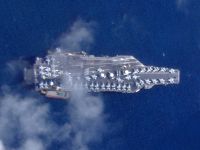The future of the island nation of Cyprus is uncertain. Recent changes in Cyprus are rekindling hope of progress toward finding a solution for this divided island, though serious obstacles remain.
Greek and Turkish Cypriots have long been divided. Yet some hope has emerged recently. The veteran leaders of the two communities of Cyprus are embarking on what the United Nations hopes will be several months of talks. The aim by mid-summer is to reach a settlement to one of the most stubborn disputes in the world.
The Greek Cypriot President Glafkos Clerides is recognized internationally as the legitimate ruler of the whole island. Nonetheless, Turkish Cypriots in the North, headed by Rauf Denktash, have declared their independence, and are back by 30,000 Turkish troops. The United Nations has separated the two sides since 1974.
Yet Mr. Clerides and Mr. Denktash have recently visited each other for the first time in a generation, providing some hope for a resolution. But locals believe that international moderation, from the likes of the U.S. or U.K. is needed to resolve the dispute. "They need help from someone like Bush say, or the British Government," commented Spirou Kiriagos.
"If those two countries are moving things a bit, they can find a good solution for Cyprus."
Greek Cypriot’s government application for accession to the E.U. is seen as providing impetus for renewed talks. It is expected to be approved by the end of 2002. Should Cyprus's application be delayed in any form, Greece has threatened to hold up the entire EU enlargement process.
The Greek Cypriots insist that the basis for a solution must be a bi-communal federal state, while Turkish Cypriots calling for a much looser confederation of two sovereign states.
Turkish Cypriots declared independence on their part of the island in 1983, but their self-declared republic is recognized only by Turkey. The Greek Cypriot government is internationally recognized. (Albawaba.com)
© 2002 Al Bawaba (www.albawaba.com)







